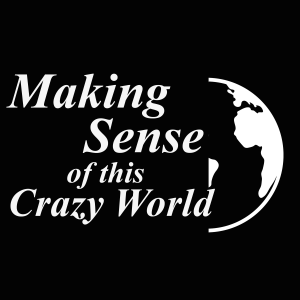Making sense of this crazy world
I am a student of history, a teacher of history and a writer of history. You could say history is a passion of mine. I have a website for students and I had been mulling around this idea of a podcast for some time. Would people be interested? Would I make it interesting? That’s essentially what was holding me back. But with a new year starting, the craziness still all around us, I thought what the hell – give it a go, John! The primary purpose of the podcast is to use history to help us make a little more sense of this crazy world we are living in. I aim to do this by using history. It’s not the only tool to be used, but it is my chosen tool. Everything happens in a context and that context is recent history. But that recent history is almost always the result of older history. We have to go back into our past to understand today. I could easily rattle off a hundred other aims but trust me, they will be introduced as we go along. But there are two other aims I must own up to straight away. The first is that I really want to lay it on the line that history is always about people. I think it was the great historian, Eric Hobsbawm who said unemployment is an economic statistic but a human experience. And you can’t appear to be further away from people than with dry statistics – but you’re not. And the second is that there is always more than one story to tell; more than one “truth”. History is an interpretation of the past, nothing more. There are always other interpretations. When we look at this crazy world of ours today and try to make sense of what is happening, it is so important to bear that in mind - someone else thinks differently. And if we don’t understand that other interpretation, if we don’t even know it exists, then we can’t reach an understanding of what is happening. And our truth is less secure! I hope that makes sense.
Episodes

Sunday Nov 02, 2025
Sunday Nov 02, 2025
There were those who criticised Roosevelt for not doing more, but it is the criticisms from the capitalists who complained he was doing too much, interfering in the economy too much, that I want to focus on. We’ve touched on it from time to time in the last two episodes, but I want to shine a spotlight on it because their determination to undo what he had achieved would, eventually, lead to the financial crash of 2008.

Sunday Oct 26, 2025
Sunday Oct 26, 2025
Roosevelt's Second New Deal was different in character. Its emphasis was on reform: reforming the capitalist system that had failed Americans; indeed, had failed itself. And providing for a fairer society with protection for workers and better pay and work conditions, and welfare support for the wider population.

Sunday Oct 19, 2025
Sunday Oct 19, 2025
Roosevelt's package of new laws and initiatives that together constituted his New Deal for America, offered three things: Relief, Recovery and Reform. It set out to save Americans from the Great Depression and to save capitalism from itself.

Sunday Oct 12, 2025
Sunday Oct 12, 2025
I think it’s important to focus on 1932 in the Great Depression because it shows the depth of the impact the depression had on people’s lives, it shows how choices are important in history as they are in life, and it shows how democracy can work to stabilise a state that’s in deep trouble.

Sunday Oct 05, 2025
Sunday Oct 05, 2025
I’m going to begin this week with a song. But don’t worry – I’m not going to sing it! The song depicts how men who had contributed to America’s economic well-being and who had fought for their country were now left begging for small change. Because this week, we’re looking at the impact of the Wall Street Crash and the Great Depression that followed in its wake.

Sunday Sep 28, 2025
Sunday Sep 28, 2025
A tragic tale of how badly things can go wrong when capitalism is unregulated.

Sunday Sep 21, 2025
Sunday Sep 21, 2025
If radicals and newer immigrants faced American intolerance, so too did a group of people who had been in America much longer, had not asked to be there but who, as a consequence, had already suffered in ways no human being should have had to endure: African Americans.

Sunday Sep 14, 2025
Sunday Sep 14, 2025
Last week we were looking at divisions in American society, well America was not only divided, it was a remarkably prejudiced, intolerant society. Examples are many but I will focus this week on immigrants and the ‘Red Scare’, and particularly on the trial of two Italian-born immigrants: Nicola Sacco and Bartolomeo Vanzetti.

Sunday Sep 07, 2025
Sunday Sep 07, 2025
We can see divisions in American society on a number of fronts: politically, racially, between the poor and the rich, but America was no more split than it was between the city and the countryside. Rural America was ill at ease with the apparent self-indulgence, materialism and the looser morals that they saw in city life. They were concerned that Christian values seemed to be breaking down, and with them, the traditional country values of clean living, hard work and thrift. I’m going to look at two cases that highlighted that split. Hopefully, this episode will give you an insight to the way America is split today.

Sunday Aug 31, 2025
Sunday Aug 31, 2025
I’ve been looking at industrial revolutions and the development of capitalism. First, in Britain, the world’s first industrial revolution, and then moving across the Atlantic to America and this week I want to dig a little deeper into the kind of society that developed in America in the 1920s.



